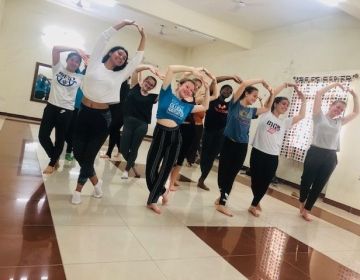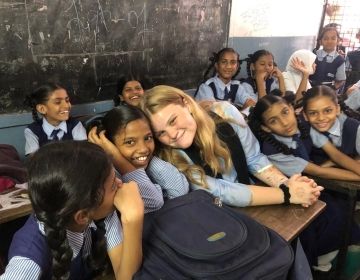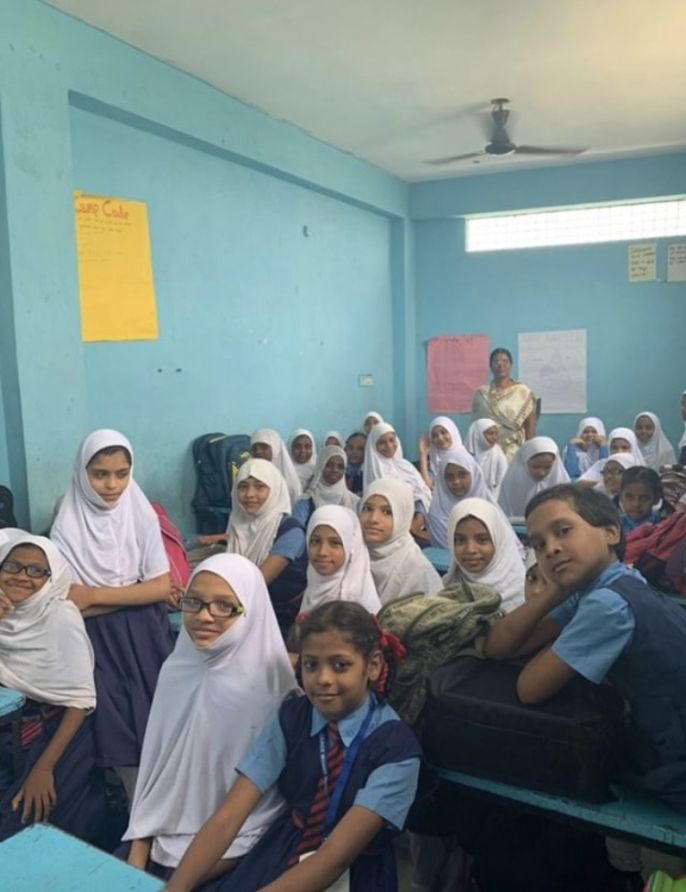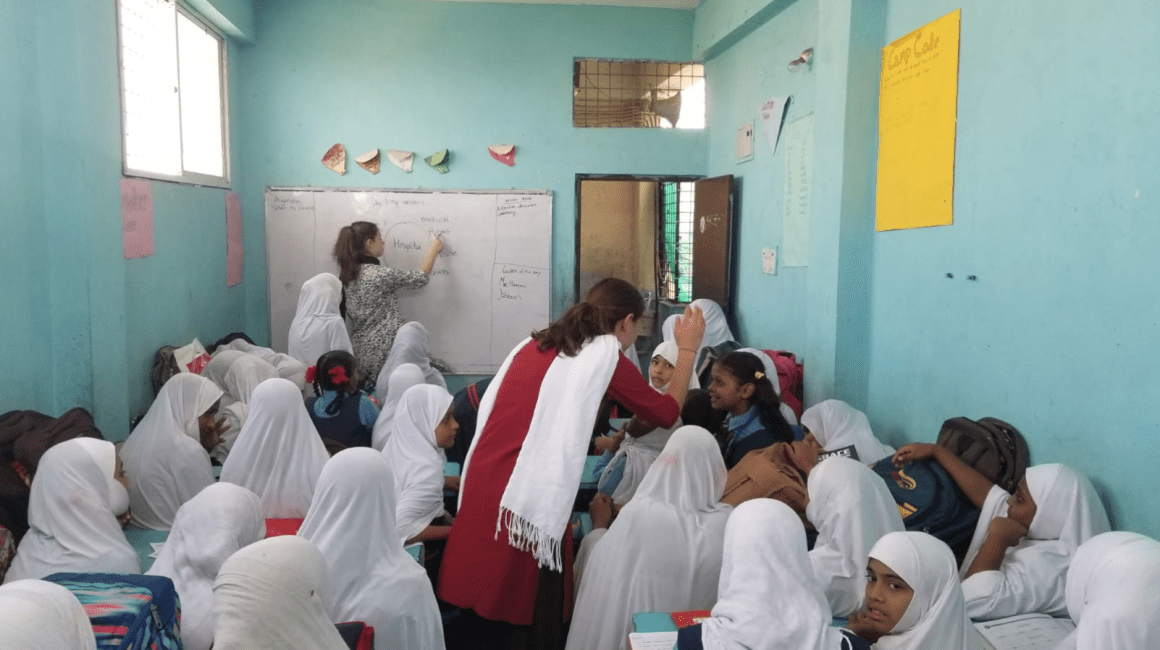23%
23% of girls in India drop out of school when they get their first period. That’s what I had in mind when I was working at Grace Model School with my girls. In that sense, I was slightly disappointed that our curriculum wasn’t more focused on health education, but as our India based program coordinator pointed out, perhaps we, as American teenage girls only here for 3 weeks, weren’t prepared to deal with the cultural and religious influences on the perception of menstruation in this country. Anyway, I admit that I went into this program with some semblance of a ‘we’re helping to liberate them’ fixed mindset, instead of a ‘we can both learn from each other’ growth mindset. Of course there are things that I perceive as ‘wrong’, or detrimental to Indian society, (specifically regarding gender relations), and of course there are things that some Indians perceive as ‘wrong’ regarding American society and culture. The thing is, life isn’t black and white; our ideals all lay somewhere in that infinite expanse of grey. India doesn’t have to follow the United States or any European country to get to a place that is ‘right’, and who knows where this country would be if it has not suffered the far reaching effects of British colonialism. However, there objectively are improvements that could be made here in order to improve life for a vast sector of the population.
I was extremely surprised when some of my classmates were given classes of boys, some of them being of an older age, until I realized that the dramatic improvements to women’s rights that I hope to see cannot be made without educating the boys. Instead of teaching our girls how to prevent rape, or how to hide their menstruation, or so on, why don’t we teach our boys to be feminists, and fight for the same rights we must teach our girls to demand? Boys are also hurt by the lack of gender equality, and it is their right and responsibility to be part of the solution. Change can only come by educating the children, so they can make their own informed choices.
I was so impressed when we ate lunch in the Voice 4 Girls office with the main coordinator, as I was listening to her incredible insights into women’s rights and education methods. I don’t think I’ve ever met a more inspiring person, and I would seriously recommend going on this trip if just to meet her. I instantly connected with her when she described working towards being a professional cricket player even though she hated cricket, just because she was repeatedly told that she couldn’t do it. She then proceeded to say something along the lines of “in life, you can never make anyone around you completely happy. But you can work to make yourself completely happy”. Thus, she stopped playing cricket and stopped being an engineer and started doing what she was passionate about. She’s exactly the kind of person I aspire to be.
In a country where being gay, especially as a woman, could result in death (even though homosexuality was recently legalized by the Indian government), there come many stigmas surrounding sexuality, gender and the gender spectrum. Voice 4 Girls handles the cultural and religious blocks to certain important aspects of life gracefully by providing all sides of the argument without telling children what they should believe or do. I feel the need to strongly convey that I believe choice is key here. Pushing your beliefs and values on someone isn’t right and will likely result in either pushback, or ignorant support, but educating them in multiple perspectives and giving them choice is when positive and permanent change occurs. Giving girls a choice regarding their menstruation, sexuality, and in general, life, is the first step towards gender equality.
One other seemingly random thing I noticed during the many hours driving through the streets of Hyderabad was the vast number of fertility clinics. I was incredibly confused until our female sexual health presenter pointed out that improper hygiene during menstruation, such as not washing a cloth pad properly, using scraps of unsanitized cotton or old saris instead of sanitary products, or wearing a disposable pad for too long, can lead to infertility. In a country where women suffer when they can’t bear children, the stigmas surrounding menstruation and the lack of proper sexual health education is hurting Indian women.
I didn’t realize before coming to India the true magnitude of the stigmas surrounding menstruation. Our amazing program coordinator pointed out that Indian girls generally don’t wear tampons or any sort of menstrual product that is actually placed inside the body, due to cultural values. The girls here generally also have to clean themselves when they get their period, stay confined to certain parts of the house, refrain from going to places of worship, and are all in all, extremely limited during the time they are bleeding. I’ve realized working here that there is no way we can completely change India’s values surrounding menstruation, and we shouldn’t. It’s not our place. However, I currently believe that finding ways to donate cloth pads to girls in India and girls across the world who need them and providing education about how to properly use and clean them would be a massive step in improving female sexual health across the globe. If we educate girls (and boys) about women’s rights and sexual health in a way that lets them make an informed decision about what they believe instead of us forcing our values on them, I think we will have taken a massive step in increasing gender equality and improving quality of life for women globally.
I never thought I would love teaching as much as I did. My girls were incredible. The vast majority of them were so interested in learning, and were constantly trying to connect with me. The language barrier was intense and did inhibit interaction on some level, but as cliché as it sounds, laughter is universal. I couldn’t help but try as hard as I could to make my girls laugh, whether it be dancing in front of the class, teaching them ‘Jingle Bell Rock’ and trying desperately to explain the concept of snow, or to let them ‘henna’ my hands with marker that turned out to be surprisingly difficult to take off. Some of the things my class did or said brought me to tears, whether it be commenting on my paleness before speaking of my beauty, or explaining to me that beatings are extremely common in Indian schools. I admit that I almost started to cry when I first walked up to the school and realized that it was in fact a place of learning, not just a massive, run down fire hazard. Let me tell you, trying to explain the concepts of racism, sexism, and privilege to young girls who struggle to understand prepositions is extremely difficult, and trying to keep yourself calm and motionless when you witness a teacher hitting a crying toddler is sickening. I don’t think anything will ever be more difficult in my life than watching that particular beating happen, unable to act. However, there was a day when my girls asked about my religion and we had an extremely intelligent conversation about God, or Allah, as most of the girls in my class were Muslim. My girls never ceased to surprise me, and every time I fly from now on, I don’t think I’ll be to resist trying to see if the pilot is Ayesha, a girl who talked constantly about how badly she wanted to be a pilot so she could properly see the sky. I hope she gets there someday.
Even with all the improvements that could be made to the Indian school system, (which I would be extremely interested in coming back to help with), the principle of our school and her husband were truly inspiring. It was amazing to get the chance to work with a female principle and her husband, who was extremely supportive of her education, and holds a supportive administrative role in the school. They started Grace Model to increase school attendance in some of the most impoverished sectors of the Indian society, and I can’t wait to see how they work to continue to improve life for the children in their school.
During these past few weeks, I’ve gone between loving India and hating India, between desperately wanting to go home and never wanting to leave. The emotions I’ve felt during this trip have been so jumbled and complicated and intense that I doubt I’ll ever completely make sense of them, and this trip has completely changed nearly all aspects of my life. I think it’s too early right now to see the full effect of these short three weeks on my life, but I can’t wait to see how I change for the better.
Related Posts

Bollywood!
Yesterday evening, participants experienced their very first Bollywood dance class with two local instructors. They were able to learn three different combinations to three different songs as they explored this... keep reading

Service Learning with Voice 4 Girls
Yesterday marked our last day of service learning at the two local schools in Hyderabad - M.A. Ideal and Mohammed Memorial High school. This week was a whirlwind of classroom... keep reading

INDIAN CUISINE COOKING CHALLENGE!
This morning, the participants were in for a tasty, competitive treat. They traveled to The Culinary Lounge where they learned how to make 4 Indian staples in four different teams... keep reading


